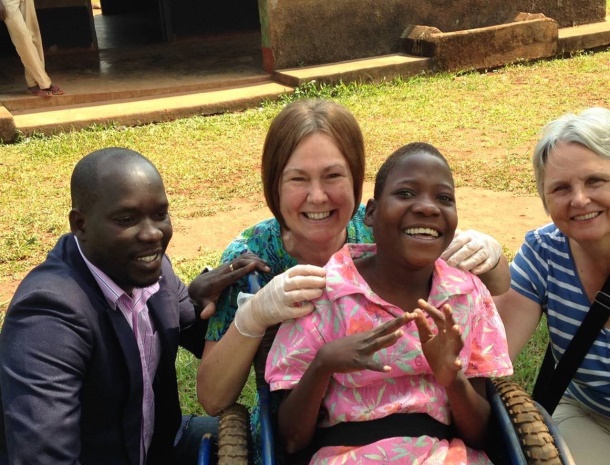PROGRAMMES
The Barbara Project
The Barbara project was started in 2011. It came about following a visit by two health professionals from UK, Penny and Katy, who visited the parish of Bupadhengo in Busoga linked to their church, Shirley Parish Church, in Southampton.
They named the project ‘The Barbara Project’ in loving memory of Katy’s Sister Barbara who died in 2006 aged 50 from cancer. She had worked devotedly most of her life with children with profound physical and learning disabilities.

Katy and Penny learnt that to have a disability in Uganda often meant considered at best useless to society- at worst cursed and hidden away. This coupled with a very patchy health care system and often extreme poverty meant that there are a lot of children and young people with disabilities who never have the opportunity to achieve their potential in Uganda.
They both experienced a ‘calling’ by God to return to Uganda to use their respective medical skills in some way. This was later confirmed when they received an invitation to work in partnership with a Ugandan non-government organisation ‘Family Life Education Program’ (F.L.E.P.) to pioneer a service to improve the lives of disabled children in the remote villages of Busoga. F.L.E.P. runs 65 health centres in remote villages scattered throughout Busoga. These health centres provide ante and post- natal care, H.I.V. and malaria testing, also immunisation clinics for children.
Penny and Katy are associate mission partners with Church Mission Society (CMS). CMS has supported them in this project with training, advice and encouragement.
The Barbara Project team consists of four people:
Penny and Katy from UK who visit three to four weeks once a year in an advisory, teaching and training capacity and who organise the funding for the project.
Two Ugandan professionals working with Ugandan Non- government organisations. One is a Community Based Rehabilitation (C.B.R.) worker employed by F.L.E.P. and one is a fully qualified physiotherapist employed by the n.g.o. ‘Soft Power’ they both keep the work going between visits by Katy and Penny.

The Aims of ‘The Barbara Project’
- To improve the quality of life of disabled children in remote villages throughout the Busoga Diocese.
- To Improve the awareness, prevention and treatment of disabled children in the remote villages.
The Aims above are achieved as follows:
- Assessment clinics for disabled children are held in the F.L.E.P. health Centres by the Barbara Project Team. Arising from the assessment clinics mobility equipment in the form of crutches, wheelchairs, shoe raises, walking frames are issued where necessary. In some cases simple exercise programs are given and on occasions referrals are made to the nearest specialist hospital. Our C.B.R. worker will carry out follow up visits to issue equipment and follow up exercise programs.
- Workshops are held in the villages for health professionals, head teachers, village and government officials and parents plus representatives of the local disabled persons’ forum. At these workshops teaching is given on the medical causes of disability in babies/children, the treatments available and the early recognition of disability and the prevention of disability. Currently the project is trying to encourage a basic form of screening system for the new-born, infant and toddler and earlier referrals. So often in Busoga disabled children present too late for advice and treatment i.e. once deformity has set in and it is then harder for them to reach their full potential.

The impact of the work
So far over 600 disabled children have been reached from 50 different remote villages in Busoga. Over 200 wheelchairs have been issued, 50 pairs of crutches and numerous shoe raises, shoes and exercise programs. The team have been delighted to see many of the children they have seen attending schools in their wheelchairs and also that many schools have recently built concrete ramps enabling wheelchair access to classrooms. The team have also seen older teenagers issued with a wheelchair or mobility trike gaining employment successfully.
There are still many more disabled children in need to reach in Busoga and there is a considerable need for the workshops to improve understanding about disability issues. The children continually grow out of their wheelchairs and also their wheelchairs wear out quickly with the African terrain. There is therefore considerable need for this work in Busoga and funds for equipment to enable the lives of these children to be transformed. All donations to the Barbara Project go directly to fund equipment for the disabled children or to fund our Ugandan health workers. As Enable Busoga is a registered charity any donations can be gift aided if the donor is a tax payer.
Penny and Katy are grateful to Church Mission Society for the initial training they provided to equip them for this work and for their continuing interest and encouragement with the project.
We remain grateful to donors (many of whom are from the congregation of St. James By The Park Shirley). Our donors have given generously to the work of this program over many years. Without these donations we would not have been able to issue the life changing prescribed mobility equipment. In particular we wish to thank the Walkabout foundation who have given us 50 wheelchairs to distribute to these children.
Covid 19
Uganda has been in lockdown due to covid 19 since March 2020 it has therefore been impossible to run assessment clinics. Assessment clinics were however held by the team in February that year and the prescribed equipment has been issued. Clinics will resume once schools are allowed to open again.
The project is now sustainable in terms of ‘manpower’ in Uganda. Penny and Katy are looking to cease their visits in 2022. Benson and Stephen will continue the actual running of the project however donations will still be needed to purchase the essential mobility equipment and for expenses to enable the team to travel to the villages.